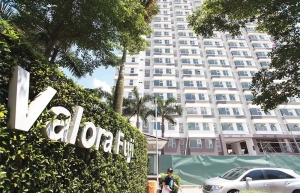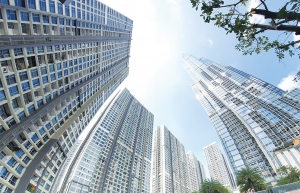Real estate developers accelerate land expansion
 |
| Major players in Vietnam are pursuing land expansion, with some focus on high-end or social products, photo Le Toan |
Danh Khoi Group JSC plans to buy two projects in Q4 this year to develop next year and beyond. The group will invest $8.1 million to acquire part of Dai Nam Residential Area in Chon Thanh district in the southern province of Binh Phuoc, and has set aside another $7.5 million to acquire a portion of a project in Ham Thang-Ham Liem area in the south-central province of Binh Thuan.
Dai Nam Residential Area spans 100 hectares, with detailed 1/500 planning approved in 2018. Situated along National Highway 13, near major industrial parks in Binh Phuoc, the venture offers a strategic location for commerce and trade.
Le Thong Nhat, chairman of Danh Khoi, outlined the company’s strategy, which focuses on fully legalised projects with high liquidity.
“We have reviewed many ventures, prioritising those with developed infrastructure and land titles issued, creating liquidity and new opportunities this year,” Nhat said.
Nam Long Group is also increasing its land holdings for mid-range products through mergers and acquisitions (M&As) and raw land development. At the same time, the group continues to develop and exploit Mizuki Park, Waterpoint Phase 1, Akari City, and EHome Southgate.
Lucas Loh, CEO of Nam Long Group, explained that the company’s approach is rooted in developing products that meet real societal needs, transforming urban landscapes, and enhancing quality of life.
“Nam Long maintains a healthy financial structure and is a trusted partner for major foreign investors. My experience in larger markets will help strengthen the company’s foundation as we align with Vietnam’s sustainable development goals,” Loh said.
Similarly, Dat Xanh Group chairman Luong Tri Thin revealed the company’s plans to secure 100-200ha of fully legal land nationwide for projects. The group aims to acquire existing land with potential for residential development to meet actual market demand.
“Our immediate focus is on acquiring clean, legally compliant land in Binh Phuoc and Dong Nai to expand our portfolio in the coming years,” Thin said.
Phat Dat Corporation is another major player pursuing land expansion, focusing on high-end products and social housing. At an August meeting with investors in Ho Chi Minh City, Phat Dat chairman Nguyen Van Dat said that the company is now actively bidding for projects and seeking M&A opportunities with clear legal frameworks.
“During our recent restructuring, we sold several projects to generate cash flow. Now, we are looking to deploy three new ventures for every one we sell. Phat Dat is poised to enter a new growth cycle with the launch of significant projects in the second half of this year,” Dat said.
Phat Dat is expected to launch sales for the Bac Ha Thanh project in the south-central province of Binh Dinh in September and Thuan An 1-2 in the southern province of Binh Duong in November, with anticipated revenues of $833 million.
If the market recovery continues, Phat Dat may introduce products from 2-3 additional initiatives. The company currently holds over 4,000ha of clean land, positioning itself for significant future growth.
Other major developers such as Novaland, Ha Do, Ecopark,
Vinhomes, and Phu My Hung are also expanding their land reserves, targeting 50-150ha in localities like Lam Dong, Long An, Haiphong, and Binh Thuan to support upcoming business activities. This trend is reflected in an August report from the Ministry of Construction, which noted that legality, liquidity, and land use fees are key investment criteria for developers.
“Developers are being more strategic, carefully researching the market to acquire legally compliant land with full land use fees paid, ensuring projects can be operational in the coming years,” the report said.
| Pham Anh Khoi, former director Dat Xanh Services Accelerating M&A activity in real estate projects has been a key move since the new real estate laws took effect on August 1. These laws require investors to negotiate land use rights at prices closer to market rates, which will inevitably increase input costs. Moreover, stricter regulations on land subdivision mean only financially strong investors will survive. Those heavily reliant on loans face significant challenges and risk being acquired. Real estate businesses are now racing to clear bottlenecks with state authorities. Developers are also regaining confidence in selling properties, aiming to restore trust among investors and buyers. Su Ngoc Khuong, senior director Savills Vietnam Land is a major issue for real estate businesses. Domestic and foreign investors are eager to find clean land in major cities like Hanoi and Ho Chi Minh City, but the availability of such land is currently limited. Even when they successfully acquire land, it often takes considerable time to complete legal procedures before projects can proceed. As a result, developers have shifted strategies, participating in land auctions where the land is legally clear. While this means paying higher prices, it allows for immediate implementation. With Ho Chi Minh City running out of clean land, investors are now turning to urban areas surrounding the city, which are benefiting from infrastructure, transportation, and utilities development. In the future, satellite cities will become key areas for development, offering significant opportunities. Ho Anh Tuan, CEO, Ho Chi Minh City Foreign Trade and Investment Development In addition to residential real estate businesses, those operating in the office and resort leasing sector such as ours are also targeting land that is suitable for our core business areas. The upcoming orientation is to continue to seek office projects in the central area to develop ourselves or provide operational services. We estimate that revenue from office leasing in the 2024-2025 period will stabilise at around $2.5 million per year, especially after completing the office building on Phung Khac Khoan street in Ho Chi Minh City and restructuring tenants at the Mac Dinh Chi building. We are also waiting for legal procedures to be solved for the Binh Trung Dong and Can Gio projects by competent bodies, and then we can start the construction. Pham Thu, chairman, Saigonres Group Our business strategy this year is to expand mergers and acquisitions, seeking clean land and increasing capital to implement large ventures. The company is applying for licences for 26 projects from parent and member companies, stretching from Mong Cai in Quang Ninh province to Phu Quoc in Kien Giang province, with land covering more than one million sq.m. According to the plan, in 2024, we aim for total revenue and pre-tax profit to reach VND628 billion ($25.4 million) and VND190 billion ($7.7 million), respectively, increasing by 240 and 48 per cent compared to 2023. As of 2023, the parent company and member companies have managed and implemented 13 initiatives. In addition, the company is continuing to promote the development of new projects in Moc Bai in Tay Ninh province, Cu Chi district in Ho Chi Minh City, and several other provinces and cities across the country. Trang Bui, country head Cushman & Wakefield Vietnam The 2024 market is witnessing the return of more potential domestic enterprises to continue the race to acquire clean land, while foreign investors are hunting for projects facing financial difficulties after two years of restructuring. The investment appetite of enterprises at this time is for projects with clean land, good quality, real value, legal ownership, complete compensation and clearance, and development potential. It is obvious to developers that the larger the available land they have, the more advantages they hold. However, a large amount is not the decisive factor for the success or failure of a developer. The reason is that, in the context of the real estate market that has just recovered from the bottom, difficulties still surround. If the recovery speed is not as expected and the inventory of enterprises continues to increase, the developers who are using loans to develop land will face a huge debt burden. The recent period is the time for purification, transfer, modification and preparation for the next steps of the market, especially the housing market. New regulations will facilitate businesses to expand the market and further their cooperation. There will be a large amount of capital from foreign investors pouring into the Vietnamese real estate market in the period of 2024-2026. Many transactions have been in the negotiation process and have quite positive signals. |
 | Japanese bold on ventures in real estate Japanese investors continue to participate more deeply in merger and acquisition activities in the real estate sector in Vietnam, with a series of new initiatives and expanding portfolios. |
 | Land price framework remains inefficient Adjusting a land price framework according to the market is necessary, but a number of points could be considered before approval and application, according to experts who contributed to the draft of the adjusted price for the new land law. |
 | Vietnam intent on realising green building aspirations Although the amount of social housing in Vietnam is still very modest, the government and investors are determined to develop green social housing to meet market trends. |
What the stars mean:
★ Poor ★ ★ Promising ★★★ Good ★★★★ Very good ★★★★★ Exceptional
Related Contents
Latest News
More News
- Saigon Centre gains LEED platinum and gold certifications (February 12, 2026 | 16:37)
- Construction firms poised for growth on public investment and capital market support (February 11, 2026 | 11:38)
- Mitsubishi acquires Thuan An 1 residential development from PDR (February 09, 2026 | 08:00)
- Frasers Property and GELEX Infrastructure propose new joint venture (February 07, 2026 | 15:00)
- Sun Group led consortium selected as investor for new urban area (February 06, 2026 | 15:20)
- Vietnam breaks into Top 10 countries and regions for LEED outside the US (February 05, 2026 | 17:56)
- Fairmont opens first Vietnam property in Hanoi (February 04, 2026 | 16:09)
- Real estate investment trusts pivotal for long-term success (February 02, 2026 | 11:09)
- Dong Nai experiences shifting expectations and new industrial cycle (January 28, 2026 | 09:00)
- An Phat 5 Industrial Park targets ESG-driven investors in Hai Phong (January 26, 2026 | 08:30)

 Tag:
Tag:



















 Mobile Version
Mobile Version